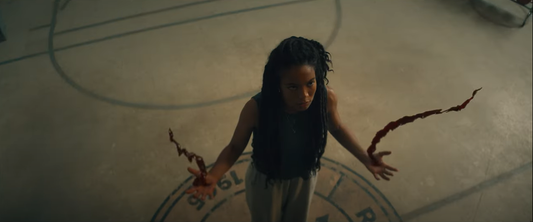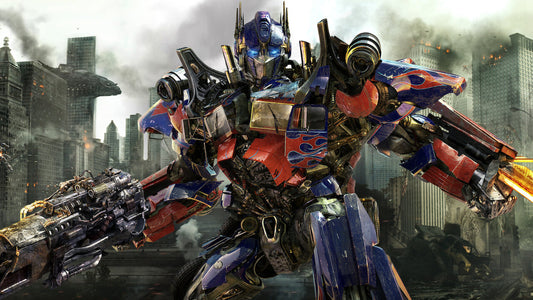Stories about coming to the realization that our gods and our leaders have used and failed us, choosing to defy those higher powers, even destroying them outright, and having to find new purpose in an infinite and indifferent universe isn’t something you might expect to come out under the banner of family-friendly Disney entertainment. Kill Your Masters / Idols / God is a creed usually reserved for media and art that’s a bit more extreme (or at least more thoughtful) than your average House of Mouse superhero movie.
But Thor: Love and Thunder, despite being the latest in the seemingly never ending conveyor belt mega-franchise that is the Marvel Cinematic Universe, is no run-of-the-mill superhero action frenzy. In fact, it’s partly due to the fact that this is the 29th (!!!) film in the series (not counting the multiple television shows) and the 8th overall appearance of Chris Hemsworth as the character that it’s allowed to break free of most conventions (at least as far as Disney seems willing to allow) and tackle bigger, bolder ideas under the guise of lighthearted fun.
Taika Waititi returns to direct the God of Thunder in what is now his 4th solo outing, making Thor the first of the Marvel heroes to have their own set of films go beyond a trilogy. In 2017’s Thor: Ragnarok, Waititi injected the character with a welcome dose of colorful fun that took Thor from being one of the arguably duller Avengers to an instant fan-favorite. Bringing the director back was a no-brainer, and while Love and Thunder may not hit the same comedic heights as its predecessor and is held back by a handful of larger production issues, it still manages to burst through the muddled fourth phase of the Marvel Cinematic Universe and puts its overarching themes in a clear and connective context.

Courtesy of Marvel Studios
Love and Thunder sees Thor (Hemsworth) in an interesting place. With Asgard and most of its people gone, the throne passed over to Valkyrie (Tessa Thompson), the Avengers disbanded, and lacking any real loved ones in his life (pretty much all of them are either dead or moved on at this point), the unkillable god prince now spends his days in quiet meditation. No longer interested in making any real attachments, he simply waits until he’s called on by other heroes to easily win battles for them. The arrival of a new powerful villain named Gorr the God Butcher (Christian Bale) puts Thor back in action alongside Valkyrie, Korg (Waititi) and much to his surprise, Thor’s ex-girlfriend, famous astrophysicist Jane Foster (Natalie Portman returning to the franchise), who suddenly wields his old hammer Mjolnir.
It’s a refreshingly straightforward plot for a movie this deep into the franchise; Thor and company mostly just chase Gorr around as he works to enact the goal of his namesake and, well, kill all of the gods in the universe. More casual fans of the MCU will be happy to know that extensive knowledge of the series isn’t really required to jump right into this latest adventure, so a 28 film rewatch is thankfully unnecessary. In that same regard, Love and Thunder is also free from the baggage of Marvel’s indulgence in multiverse fan service and tiresome cameos as of late. It’s made all the more refreshing that the film clocks in at under two hours, most of which flies by at a brisk pace.
Love and Thunder’s biggest issue is just how unfortunately often its comedy doesn’t land. This isn’t even close to the same level of funny as Ragnarok was. While Waititi’s offbeat style of comedy does at least feel more naturally interwoven into his films as opposed to other MCU films’ awkward stabs at humor, far too many jokes simply hang in dead air this time around. Sometimes it’s hard to tell whether the recent oversaturation of the New Zealand filmmaker and performer has made some grown tired of his shtick, or if he simply lost that specific touch on this film. Korg is especially aggravating this time around, making me lean more towards the latter.

Courtesy of Marvel Studios
Like other recent Marvel projects, Love and Thunder also suffers from a seemingly rushed and constantly-changing production. As you may be aware, Marvel Studios went from producing one or two films a year to now having several films, television series and specials all in active development all at the same time. What once appeared to be a well-oiled machine has since been revealed to have become a bit of a chaotic process, where films and series are continuously being changed on the fly even well into post-production (this has seemingly been the case for Disney Animation as well). Scenes and characters can feel stitched together in strange ways and multiple VFX shots and sequences look straight up bad for a movie with such a massive budget (over $250 million!). Too many scenes appear to have been filmed and staged as cheaply as possible (think flat, Disney Channel style, an increasingly common look for the MCU), no doubt in service of being able to more easily change, add in, or remove any number of VFX later down the line.
It’s sad to see some of the franchise’s biggest swings, more interesting concepts and more diverse casts as well as ideas come at the same time that the productions of these films only appear to be growing cheaper despite their ever inflated budgets. But what Love and Thunder proves is that strong characters and story are ultimately what matters, and the way Waititi’s film really brings together the overarching themes of Phase 4, particularly those explored in Eternals, Loki, and Multiverse of Madness, is what helps it overcome most of its aesthetic problems. As silly as some of these films may seem, this franchise is now tackling the bigger and more existential concepts of the Marvel comics the deeper it goes into the material,
Everyone in Love and Thunder puts their faith in a higher power only to be let down. Gorr loses his daughter and his people to a cruel, mocking and indifferent god that he prayed and devoted his life to, setting him on his murderous path. Jane dedicates her entire life to science only for it to fail her when she’s diagnosed with a terminal disease. Thor, already disillusioned by various losses and failures of his own, meets his idol, the one and only Zeus (Russell Crowe), only to be disappointed and even end up in opposition to him. Meeting your god, your hero, or a leader of any kind and waking up to the truth that they may not be all what you expected, hoped and prayed for is a strong thematic throughline that the film somehow handles with both bluntness and nuance.

Courtesy of Marvel Studios
Much of the post-Endgame MCU has rightfully been exploring that question and feeling of what happens when the party’s over. When the longest and most important chapters of your life have seemingly come to an end, when the ways of life that you once knew are long gone, where do you go from there? Losing one’s faith in any kind of sense (in religion, in institutions, in the future, etc.) is a turning point for anybody’s life. Realizing you’re on your own and deciding what to do with that, who the person is that you want to be after the fact, is what matters. And as cheesy as it is, Marvel’s current conclusion is that all that matters is love - that we should always open our hearts to it and that we can always find renewed purpose in it. Like I said, 100% cheesy, but in today’s doomful and nihilistic world, it’s as timeless and as essential a message as it’s ever been.
Thor‘s journey began with Jane and it beautifully comes full circle in Love and Thunder. She is what made him worthy of his powers to begin with and who first taught him to care about and fight for someone other than himself. Jane is what made Thor a hero and bringing her back when he’s at a crossroads with his life once again is a brilliant move. I, for one, appreciate revisiting the initial love interests for these characters, something the recent Doctor Strange did effectively as well. The romances of these stories were initially some of, if not the most important aspects of the character and then were seemingly abandoned, so it’s nice to have them back and reiterate their significance.
There may be no eternal reward for us in the end and we will always continue to experience pain and loss no matter what higher power we choose to believe in. That much is true. But we must always find a way to move forward regardless, to find new meaning for ourselves, and be willing to keep our hearts open even if it means getting hurt again. Shoddy effects and bad jokes be damned, this franchise has still got it where it counts. Love and Thunder is compelling despite its outside flaws - and hopefully isn’t the last of these to be able to overcome them.
‘Thor: Love and Thunder’ is now playing in theaters.




